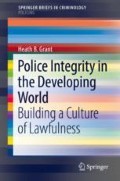Abstract
Academics always run the risk of a passionate need to categorize the world, and even its most complex problems, into the single perspective or theory that most inspired us in our earliest study and entry into the real world of scholarship. If we are not careful, this single perspective or theory can function as a dominant lens capable of blocking all else out but the facts or data that support or affirm the theory or perspective that we came in with in the first place (Rosling 2018).
Access this chapter
Tax calculation will be finalised at checkout
Purchases are for personal use only
References
Anti-Corruption Task Force. (1999). Association of chiefs of police presentation at the European Council Conference on Police Corruption, Strasbourg, France, November 1999.
Caldero, M., & Crank, J. (2011). Police ethics: The corruption of noble cause. Burlington: Elseveir.
Diemont, E. (2013). The Natrure of Corruption: An Intedisciplinary Perspective. Economic Conversations.
Dutta, S. (2011). The Global Innovation Index 2011: accelerating growth and development. Insead.
Garcia, & Rodriguez. (2016). Social determinants of police corruption: toward public policies for the prevention of police corruption. Policy Studies, 37(3), 216–235.
Gerber, T. P., & Mendelson, S. E. (2008). Public experiences of police violence and corruption in contemporary Russia: A case of predatory policing? Law & Society Review, 42(1), 1–44.
Grant, H. (2014). Social Crime Prevention in the Developing World: Exploring the Role of Police in Crime Prevention. New York: Springer.
Hobbs, D. (1998). Going down the glocal: The local context of organised crime. The Howard Journal of Criminal Justice, 37(4), 407–422.
International Association of Chiefs of Police. (2014). Model policy on standards of conduct. Retrieved from http://www.theiacp.org/Model-Policy-on-Standards-of-Conduct
Kelling, G. L., & Moore, M. H. (1988). The evolving strategy of policing. Washington, DC: US Department of Justice, Office of Justice Programs, National Institute of Justice.
Klaver, J. J. (2013). Law enforcement ethics and misconduct. In B. D. Fitch (Ed.), Law enforcement ethics: Classic and contemporary issues (1st ed., pp. 3–28). Thousand Oaks: Sage Lauchs.
Klockars, C. B., Ivkovic, S. K., & Haberfeld, M. R. (2003). The contours of police integrity. Thousand Oaks: Sage Publications.
Lauchs, M., Keast, R., & Yousefpour, N. (2011). Corrupt police networks: Uncovering hidden relationship patterns, functions and roles. Policing and Society, 21(1), 110–127.
Newburn, T., & Webb, B. (1999). Understanding and preventing police corruption: Lessons from the literature.
Punch, M. (2000). Police corruption and its prevention. European Journal on Criminal Policy and Research, 8(3), 301–324.
Rosling, H. (2018). Factfulness: Ten reasons We’re wrong about the world – And why things are better than I think. New York: Flatiron Books.
Sherman, L. W. (1978). Controlling police corruption: The effects of reform policies, Summary Report.
Sherman, L. W. (1985). Becoming bent: Moral careers of corrupt policemen.
Skolnick, J. H., Feeley, M., & McCoy, C. (2005). Criminal justice: Introductory cases and materials. New York: Foundation Press.
Transparency International. (2014). Global Corruption Barometer 2013. Retrieved from http://www.transparency.org/gcb2013/in_detail
Waddington, P. (1999, March 1). Police (canteen) sub-culture. An appreciation. The British Journal of Criminology, 39(2), 287–309. https://doi.org/10.1093/bjc/39.2.287.
Williams, H. (2002, December). Core factors of police corruption across the world. Forum on Crime and Society, 2(1), 85–99.
Author information
Authors and Affiliations
Rights and permissions
Copyright information
© 2018 The Author(s)
About this chapter
Cite this chapter
Grant, H.B. (2018). Antecedents and the Nature of Police Corruption and Impunity in Postcolonial and/or Developing Countries. In: Police Integrity in the Developing World. SpringerBriefs in Criminology(). Springer, Cham. https://doi.org/10.1007/978-3-030-00413-2_1
Download citation
DOI: https://doi.org/10.1007/978-3-030-00413-2_1
Published:
Publisher Name: Springer, Cham
Print ISBN: 978-3-030-00412-5
Online ISBN: 978-3-030-00413-2
eBook Packages: Law and CriminologyLaw and Criminology (R0)

